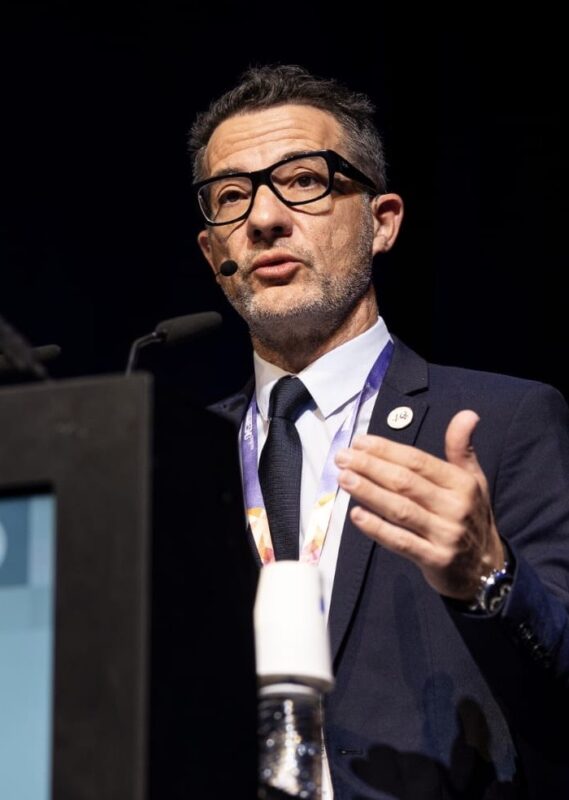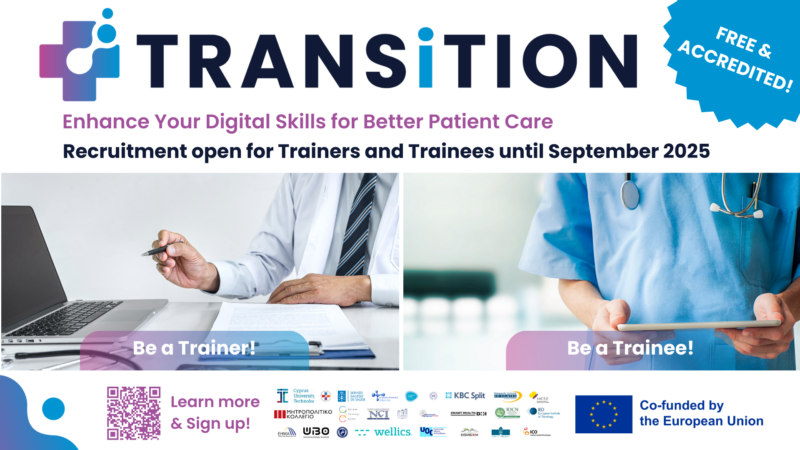In the rapidly evolving landscape of modern medicine, oncology stands as a paradox: a field driven by innovation yet curiously slow in grasping the full potential of digital revolution. To uncover the root of this reality and explore viable solutions, we spoke with Professor Andreas Charalambous, one of the leading voices in European oncology and digital health advocacy.
He believes that with a focus on training healthcare professionals and health managers, addressing resistance to technology, and developing a sustainable digital ecosystem, TRANSiTION is poised to revolutionize cancer care. Could this be the long-awaited breakthrough that bridges the gap between oncology and digital health?

Why Digital Transformation in Oncology Is Lagging Behind?
Despite rapid advancements in healthcare technology, oncology remains one of the slowest fields to integrate digital solutions. Professor Andreas Charalambous highlights the underlying issue: while innovative tools exist, they lack widespread clinical validation and real-world application.
“In comparison to other medical fields, oncology has been left behind in timely and widely adopting digital solutions. Technology is available, but it has yet to be fully and extensively validated within clinical practice. We need stronger evidence demonstrating its effectiveness and efficiency—not just in principle, but in real-world applications.” he explains.
This hesitation stems from several factors, including the complexity of cancer treatment and resistance from healthcare providers. The latter stems primarily from a lack of training and appropriate preparation, misconceptions, skepticism, and the absence of clear regulatory pathways for implementation. “We are great at developing technology, but we underperform at preparing the very people expected to use it,” he explains. “Our research found that in 14 surveyed European countries, only 4.2% of digital training programs were specifically designed for oncology—a shockingly low figure.”
Breaking Resistance: Transforming Digital Training in Oncology
The TRANSiTION Project is reshaping how oncology professionals adopt digital health solutions, recognizing that resistance to change is a major hurdle in the field, it is often rooted in fear and a poor understanding of new technologies.
“It’s natural for people to resist new technologies, especially if they are not trained and appropriately prepared to use them, but another key reason for resistance is the quality of digital tools themselves. If a technology is poorly designed or does not fit well into a clinical pathway, it will most likely be rejected.” explains Prof. Andreas Charalambous.

To tackle this, TRANSiTION ensures that training programs are tailored to the real needs of oncologists, caregivers, patients, and healthcare managers, adopting a truly co-design approach. “Before we developed training programs, we gathered insights from patients, caregivers, oncologists, and healthcare managers to ensure that we had a comprehensive perspective of the topic at hand. This facilitate the process of developing a training program that its content was relevant but also user-friendly. This is crucial to overcoming resistance and fostering trust in digital solutions.”
Ensuring Equitable Access to Training and Implementation
One of the biggest barriers to digital transformation in oncology is ensuring equitable access to digital training for all healthcare professionals. While younger oncologists and healthcare workers may be more comfortable using digital tools, older generations and professionals in underfunded regions often face challenges in adopting new technologies.
However, age isn’t the only barrier. Rural hospitals and low-resource healthcare facilities frequently lack the infrastructure required to support digital education and implementation.
Professor Andreas Charalambous explains how the TRANSiTION Project was specifically designed to address disparities in digital training access. “Inequalities when it comes to digital solutions are present. We recorded entire countries that had absolutely no formal training programs in digital skills within the oncology context. That presents an obvious inequality gap that must be addressed.”
Beyond geographical challenges, institutional limitations play a significant role in delaying digital adoption in oncology. “Some hospitals, particularly in rural or underfunded areas, lack the infrastructure to support digital training. Some of these facilities may not even have reliable internet access, making digital learning impractical. This is precisely why we designed TRANSiTION to have minimal technological requirements. It’s not only about designing technological solutions, it’s also about taking into consideration the actual realities in the clinical setting that can actually facilitate the implementation and integration of those solutions” emphasizes Prof. Charalambous.
Another major obstacle in professional education is time constraints—oncologists, nurses, and healthcare managers often struggle to balance training with their demanding schedules. “Based on the insights we gathered from healthcare professionals, non-clinical professionals (i.e. health managers), and policymakers, time constraints are a major hurdle for professionals seeking further education. That is why TRANSiTION is designed to offer flexibility. Participants can engage in the training at their convenience, rather than following rigid schedules. By doing so, we have eliminated one of the biggest obstacles to digital literacy in oncology.”
Other potential gaps have been also taken into account, TRANSiTION provides an online learning experience in 12 languages, ensuring that healthcare professionals across different regions can access training in their native language. Additionally, TRANSiTION eliminates financial barriers, offering free training and awarding accredited Continuing Medical Education (CME) credits—57 for medical professionals and 57 Continuing Nursing Education (CNE) Credits forfor nurses.
Dispelling the Misconceptions Around AI in Healthcare
As artificial intelligence (AI) becomes more integrated into medicine, one persistent fear is that it will replace healthcare professionals. Prof. Charalambous challenges this assumption.
“When it comes to misconceptions in general, in terms of digital technology, it is something that I strongly support: technology on its own, it’s not enough. It will never be enough, even in the worst science fiction scenarios. It is the human element that defines how good a technology is. For example, machine learning relies on algorithms that work at the back end of the technology. These algorithms are developed by humans and there is a continues monitoring in optimizing this over time.”
“Of course, generative AI enabled researchers to train ever-larger models without having to label all of the data in advance. New models could thus be trained on billions of pages of text, resulting in answers with more depth. But again, it is the human oversight and the human factor that plays that crucial role in making the science and the technology better.”
Thus, rather than fearing automation, oncology professionals should see AI as a tool that enhances decision-making rather than replaces it. “I would say that the greatest misconception is that technology can replace the human element. Of course, there are some repetitive tasks which require, let’s say, low effort from human beings that can be replaced by machines. But not in the complicated tasks which involve, for example, assessing, diagnosing, and treating patients.”
From Local to Global
The TRANSiTION Project has rapidly evolved from a European-focused initiative to a worldwide leader in digital oncology training. What began as a regional program under EU4Health has now gained international momentum, attracting healthcare professionals from diverse backgrounds.
“Initially, TRANSiTION was designed as a fully European initiative under the EU4Health program. However, due to overwhelming demand, we have expanded beyond Europe. Today, healthcare professionals and hospital managers from over 58 countries are actively engaged in the training. Currently, we have over 1,600 trainees and trainers, and we anticipate that number to grow even further,” states Professor Andreas Charalambous.
This expansion highlights the urgent global need for digital skills in oncology. As more healthcare systems embrace digital transformation, TRANSiTION continues to provide accessible, accredited training that equips professionals worldwide with the expertise needed to enhance cancer care.
A Project Without an End—Because Technology Never Stops
When asked about the end goal of the TRANSiTION Project, Prof. Charalambous made one thing clear: there is no definitive end when it comes to technology.
“Well, you need to know that with technology, there is no end. So, technology evolves by the minutes, by the hour, by the days,” he states.
This insight underlines an important reality: digital health solutions must continuously adapt, evolve, and be updated to remain effective. The TRANSiTION Project, designed to equip healthcare professionals with essential digital skills, is no exception.
“For us, we already have a sustainability strategy in place. Nowadays, the transition program is offered on the eOncologia platform. As soon as the project ends, the training will not end,” explains Prof. Charalambous.

With a long-term vision in mind, the training will transition to his university portal, ensuring its availability for years to come. “However, we have to bear in mind that such kind of training needs constant updating, also based on the technology that the transition is targeting at. So, after five years, if we take a look back at how the transition started and how it evolved, we will be able to see many differences in order to adjust to the new realities that the technology is creating,” Charalambous concludes.
A Vision for 2030: The Future of Cancer Care in a Digital Era
If digital transformation is successfully integrated across the oncology spectrum, what could cancer care look like in 2030? According to Prof. Charalambous, the most important shift will be in patient empowerment.
“Well, I mean, I can talk for days on how cancer care could look like with the support of technology, but surprisingly, I will only mention one, which I think is of pivotal importance when this discussion is taking place. I would say that self-management will be digitally supported and enhanced, and this will create a much more patient and caregiver empowerment in taking much more meaningful control of their own situation.”
The goal is clear: reducing the burden on hospitals and improving patients’ quality of life. “That’s what people want. They don’t want to spend their time in hospitals, not even in outpatients’ clinics for things that can be made remotely at the ease of their homes. It’s stressful. It’s demanding. They don’t want it to be part of their daily living. So, everything and anything that can be supported remotely, at home setting, patients will appreciate it, and I think technology will take us there much, like I said, with increased patient empowerment.”
It Only Takes One Minute of Your Time: A Call to Action
The conversation with Prof. Charalambous highlights the profound changes that digital transformation can bring to oncology. From professional training to patient empowerment, the impact is far-reaching.
His final message is clear: “I urge everyone reading and viewing this interview to take the opportunity and do the training as a trainer, and as a trainee. It’s a simplified way to get registered. The training will continue all the way to September 2025 as part of the funding phase of the project, so do take the opportunity.”
With TRANSiTION paving the way for a more connected, technologically advanced oncology sector, the future is already being shaped. “It only takes one minute of your time to register, and the outcomes, as we have presented them today, they’re in our moods, not only for the clinical practice, but also on a personal level and a personal development level. So, yeah, feel free to join the TRANSiTION family.”
With this, oncology professionals and policymakers alike have a pivotal opportunity to not just witness change, but to actively be part of it.



